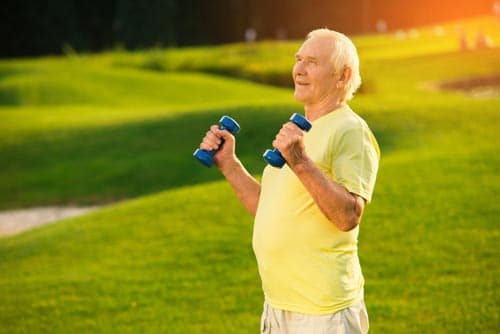The old saying “use it or lose it” pushes some of us to lift weights to retain muscle as we age. But a new study shows that lack of exercise is not the only reason we lose strength as we get older.
Researchers found a larger cause of muscle loss. And it can be prevented with a simple diet change.
We typically start losing muscle mass around age 40. The average person sheds about 10% of their muscle with each passing decade.
This can lead to fall-related injuries, slowing metabolism, and weight gain. And when you lose strength, your quality of life is diminished. You may no longer be able to play sports or do other activities you enjoy.
Scientists at Örebro University in Sweden and University of Nottingham in England looked at the relationship between muscle loss and inflammation.1
More specifically, they looked at how C-reactive protein (CRP) affects muscle mass. CRP is a blood marker for inflammation. It is produced in the liver. The higher your CRP level, the greater your inflammation.2
The researchers gathered 118 women ages 65 to 70. They collected muscle cells from the subjects. The scientists exposed those cells to CRP for 72 hours.
Professor Fawzi Kadi led the study. “We were able to see that muscle cells exposed to CRP reduced in size,” he said.3
The researchers also found the mechanism behind the muscle loss. They discovered that CRP inhibits muscle cells’ ability to create proteins necessary to maintain their mass.
“Muscles are our main protein depots,” explained Professor Kadi. “We saw that CRP interferes with the protein synthesis in the muscle cells, hence contributing to the loss of muscle mass.”
The researchers say the key to slowing muscle loss is to reduce inflammation.
Their findings were recently published in the journal Cellular Physiology and Biochemistry.
2 Best Ways to Reduce Inflammation
Chronic inflammation is the basis of physical aging. It is one of the primary causes of the so-called diseases of aging, including diabetes, cancer, arthritis, macular degeneration, Alzheimer’s, and heart disease.4
Two dietary changes can dramatically lower inflammation:5
- Increase your intake of omega-3s. Numerous studies confirm that omega-3 fatty acids have anti-inflammatory properties.
Excellent sources are grass-fed beef and cold-water, wild-caught fish such as salmon, sardines, herring, and mackerel. Or you can take a quality fish oil supplement.
- Just say no to sugar.
Spikes of blood sugar and insulin cause a cascade of biochemical and hormonal changes that result in inflammation. A Harvard study showed that women who ate foods with a high glycemic load had nearly twice the inflammation of those who ate lower glycemic foods.
Switching to a low-glycemic diet has an immediate impact on lowering inflammation.
Reduce your glycemic load by avoiding fruit juices, sugar-sweetened drinks, and sugary desserts. Replace sugar with raw honey, blackstrap molasses, or stevia. Stay away from carb-rich foods like white potatoes, pasta, white rice, bread, and cereals.
If you follow these two steps, your inflammation will drop…and you’ll have an easier time keeping your muscle as the years go by.
Editor’s Note: Muscle loss is just one more thing we have to worry about as we get older. But recent studies show that the symptoms of aging are just like any others. They can be treated or eliminated.
Go here to find out more.
Like this Article? Forward this article here or Share on Facebook.
References:
1 https://www.sciencedaily.com/releases/2018/01/180111090702.htm
2 https://www.medicinenet.com/c-reactive_protein_test_crp/article.htm
3 https://www.karger.com/Article/FullText/484679
4 https://www.institutefornaturalhealing.com/2012/05/how-to-dramatically-reduce-inflammation-a-primary-cause-of-disease-and-aging/
5 https://www.institutefornaturalhealing.com/2012/05/how-to-dramatically-reduce-inflammation-a-primary-cause-of-disease-and-aging/

